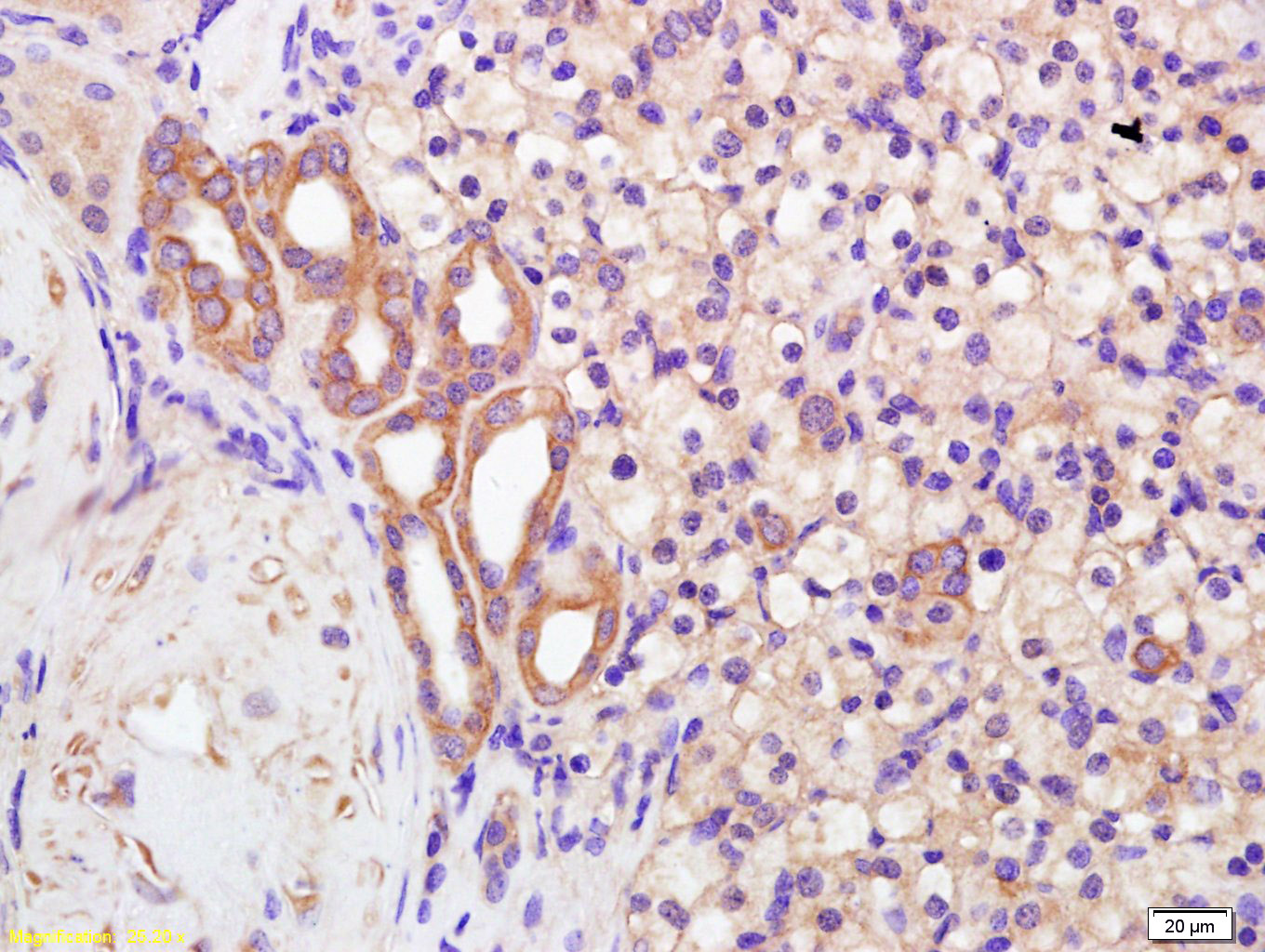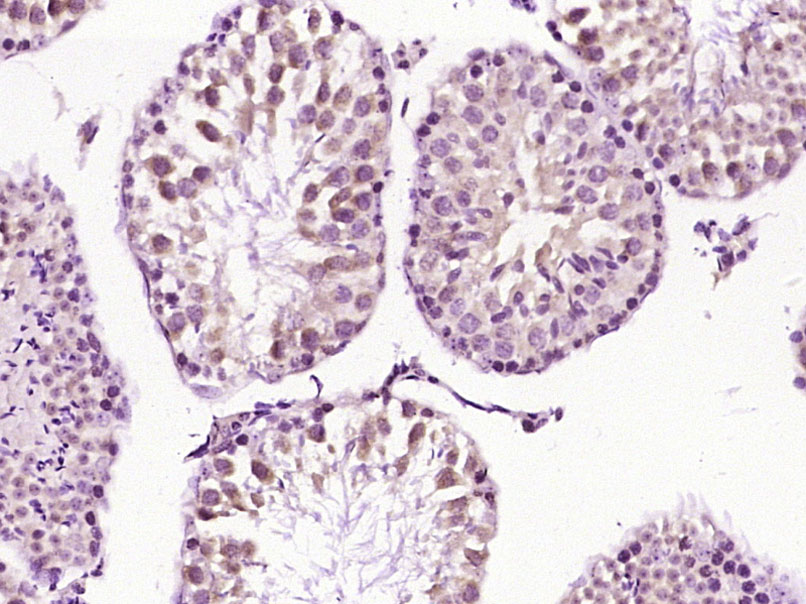
Rabbit Anti-Polycystin 2 antibody
polycystic kidney disease 2; TRPP2; APKD2, C030034P18RIK, MGC138466, MGC138468, PC2, PKD2 (includes EG:5311), PKD4, POLYCISTIN-2, POLYCYSTIN 2, RGD1559992, TRPP2; Polycystic kidney disease 2 protein homolog; PC2.
View History [Clear]
Details
Product Name Polycystin 2 Chinese Name 多囊肾蛋白2抗体 Alias polycystic kidney disease 2; TRPP2; APKD2, C030034P18RIK, MGC138466, MGC138468, PC2, PKD2 (includes EG:5311), PKD4, POLYCISTIN-2, POLYCYSTIN 2, RGD1559992, TRPP2; Polycystic kidney disease 2 protein homolog; PC2. Research Area Tumour Developmental biology Signal transduction Growth factors and hormones The new supersedes the old Immunogen Species Rabbit Clonality Polyclonal React Species Mouse, (predicted: Human, Rat, Chicken, Dog, Cow, ) Applications ELISA=1:5000-10000 IHC-P=1:100-500 IHC-F=1:100-500 IF=1:100-500 (Paraffin sections need antigen repair)
not yet tested in other applications.
optimal dilutions/concentrations should be determined by the end user.Theoretical molecular weight 106kDa Cellular localization cytoplasmic The cell membrane Form Liquid Concentration 1mg/ml immunogen KLH conjugated synthetic peptide derived from human Polycystin 2: 651-750/968 Lsotype IgG Purification affinity purified by Protein A Buffer Solution 0.01M TBS(pH7.4) with 1% BSA, 0.03% Proclin300 and 50% Glycerol. Storage Shipped at 4℃. Store at -20 °C for one year. Avoid repeated freeze/thaw cycles. Attention This product as supplied is intended for research use only, not for use in human, therapeutic or diagnostic applications. PubMed PubMed Product Detail This gene encodes a member of the polycystin protein family. The encoded protein is a multi-pass membrane protein that functions as a calcium permeable cation channel, and is involved in calcium transport and calcium signaling in renal epithelial cells. This protein interacts with polycystin 1, and they may be partners in a common signaling cascade involved in tubular morphogenesis. Mutations in this gene are associated with autosomal dominant polycystic kidney disease type 2. [provided by RefSeq, Mar 2011].
Function:
Involved in fluid-flow mechanosensation by the primary cilium in renal epithelium. PKD1 and PKD2 may function through a common signaling pathway that is necessary for normal tubulogenesis. Acts as a regulator of cilium length, together with PKD1. The dynamic control of cilium length is essential in the regulation of mechanotransductive signaling. The cilium length response creates a negative feedback loop whereby fluid shear-mediated deflection of the primary cilium, which decreases intracellular cAMP, leads to cilium shortening and thus decreases flow-induced signaling. Functions as a calcium permeable cation channel.
Subunit:
Forms homooligomers. Isoform 1 interacts with PKD1 while isoform 3 does not. PKD1 requires the presence of PKD2 for stable expression. Interacts with CD2AP. Interacts with HAX1. Interacts with NEK8. Part of a complex containing AKAP5, ADCY5, ADCY6 and PDE4C.
Subcellular Location:
Membrane; Multi-pass membrane protein (Potential). Endoplasmic reticulum. Cell projection, cilium.
Tissue Specificity:
Strongly expressed in ovary, fetal and adult kidney, testis, and small intestine. Not detected in peripheral leukocytes.
DISEASE:
Polycystic kidney disease 2 (PKD2) [MIM:613095]: A disorder characterized by progressive formation and enlargement of cysts in both kidneys, typically leading to end-stage renal disease in adult life. Cysts also occurs in the liver and other organs. It represents approximately 15% of the cases of autosomal dominant polycystic kidney disease. PKD2 is clinically milder than PKD1 but it has a deleterious impact on overall life expectancy. Note=The disease is caused by mutations affecting the gene represented in this entry.
Similarity:
Belongs to the polycystin family.
Contains 1 EF-hand domain.
SWISS:
Q13563
Gene ID:
5311
Database links:Entrez Gene: 5311 Human
Omim: 173910 Human
SwissProt: Q13563 Human
SwissProt: O35245 Mouse
Unigene: 181272 Human
Unigene: 483692 Mouse
Unigene: 6442 Mouse
多囊肾(polycystic kidney disease)为遗传性疾病,是肾脏一种先天性异常。双侧肾脏皮髓质均可累及,但在程度上可不同。在遗传方式上表现为常染色体显性和常染色体隐性遗传两种。
囊内epithelial cells异常增殖是ADPKD的显著特特之一,处于一种成熟不完全或重发育状态,高度提示为细胞的发育成熟调控出现障碍,使细胞处于一种未成熟状态,从而显示强增殖性。表现为细胞转运密切相关的Na+-K+-ATP ase的亚单位组合,分布及活性表达的改变;细胞信号传导异常以及离子转运通道的变化。Extracellular matrix异常增生是ADPKD第三种显著特征。目前许多研究已证明:这些异常均有与细胞生长有关的活性因子的参与。但关键的异常环节和途径尚未明了。因基因缺陷而致的细胞生长改变和间质形成异常,是本病的重要发病机制之一。Product Picture
Antigen retrieval: citrate buffer ( 0.01M, pH 6.0 ), Boiling bathing for 15min; Block endogenous peroxidase by 3% Hydrogen peroxide for 30min; Blocking buffer (normal goat serum,C-0005) at 37℃ for 20 min;
Incubation: Anti-Polycystin 2 Polyclonal Antibody, Unconjugated(SL2158R) 1:200, overnight at 4°C, followed by conjugation to the secondary antibody(SP-0023) and DAB(C-0010) staining
Paraformaldehyde-fixed, paraffin embedded (Mouse testis); Antigen retrieval by boiling in sodium citrate buffer (pH6.0) for 15min; Block endogenous peroxidase by 3% hydrogen peroxide for 20 minutes; Blocking buffer (normal goat serum) at 37°C for 30min; Antibody incubation with (Polycystin 2) Polyclonal Antibody, Unconjugated (SL2158R) at 1:400 overnight at 4°C, followed by operating according to SP Kit(Rabbit) (sp-0023) instructionsand DAB staining.
References (0)
No References
Bought notes(bought amounts latest0)
No one bought this product
User Comment(Total0User Comment Num)
- No comment




 +86 571 56623320
+86 571 56623320
 +86 18668110335
+86 18668110335

